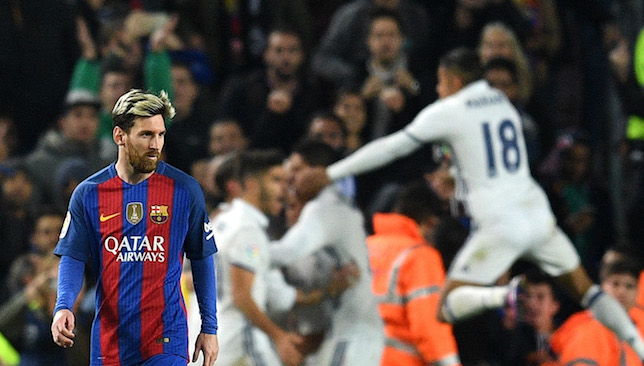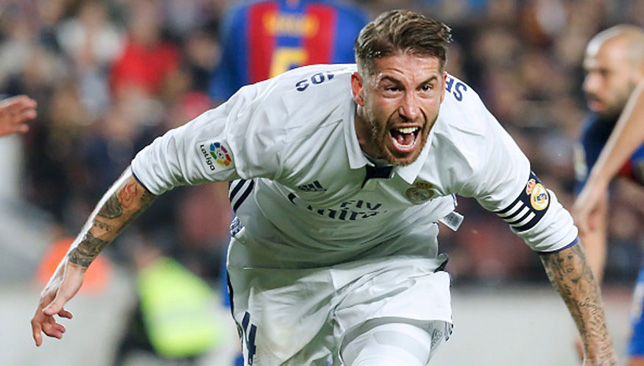
The clásico has always been a gigantic date on the Spanish cultural and political scene, but now that the game has also become an international media event the pressures on the two clubs to remain at the top have become ever greater. In terms of entertainment too, the game itself also needs to be decent, to justify the hype and the extraordinary money the event now moves. Saturday’s match at the Camp Nou, the first meeting between the clubs this season, was played at 16.15 local time, with an obvious eye on the Asian market. The game kicked off at 23.15 Beijing time – a good hour for the night-owls to enjoy the spectacle. The Spanish prefer their football later on, since 16.15 coincides with the post-lunch siesta – but marketing departments stopped caring about that type of detail long ago.
Nevertheless, the clásico remains a very Spanish affair, with a whole set of details, history and circumstances that are less interesting for those Bejing night-owls, watching the event as a football match in real time. Here in Spain, statistics always rear their head, for example. This game saw Real Madrid on a run of 32 games (cups and league) without defeat, putting them only two behind the club record of 34 set by Leo Beenhakker’s side in the 1988-1989 season. Typical of Barcelona to threaten the record, and typical of the league committee (according to the pro-Madrid press) to designate referee Clos Gómez for the match, a man with whom Barcelona had never lost in the twenty games he had adjudicated (17 wins and three draws) prompting an unspecified source from inside the leader’s dressing-room to declare that Gómez scared Real Madrid far more than Barcelona.

Sergio Ramos.
Madrid were also on 99 league goals with Zinedine Zidane, practically inviting Sergio Ramos to score the 100th in the final minute, and as ever, he obliged. Barcelona were also on 49 home wins out of the 86 played in the Camp Nou, further motivating them to a half-century of victories, although they were probably more concerned with simply reducing the distance between themselves and their opponents by three points. A Madrid win would have been the first back-to-back consecutive-season win in the Camp Nou since 1964-1965, and would have put them nine points ahead, thus supposedly guaranteeing their first league title since 2012 – the only one of which they can boast in a measly eight-year period. Interestingly, the last time that Real Madrid had visited the Camp Nou as leader was in that successful 2011-12 campaign when they won 2-1. Since then, either Barcelona or Atlético have been leading when the Camp Nou fixture has come around.
However, the most important factor was the ‘queda mucha liga’ factor (‘there’s still a long way to go’). Had Madrid won the game, Gerard Piqué would probably have said this. As it was, he said it anyway at the end of the game, to the pitch-level commentator, and he’s probably right. The 1-1- draw retains Madrid’s 6-point margin, but it is by no means definitive. Its chief function is to keep the Bernabéu investors happy and illusions intact, but in the Camp Nou they also took some positives. To neutral observers Barcelona emerged as the more lightweight of the two boxers, but this was not apparent in the regional reporting of the game on Sunday morning. This is the true essence of the clásico – and in a sense the post-partum analysis and accompanying headlines become more important than reality of the game itself. A question of perspective. This has been the case for some years now.
Much has been written of the tabloid ‘Marca’, its rather dark political history and its pro-Madrid stance. The paper still sells proudly for one euro, and can be found in every corner of Spain, every morning. Open your hotel drawer and like the Gideon Bible of old, it will be there. You cannot escape it, but in recent seasons it has toned down the bias a little and written more balanced reports. Its Sunday headline, accompanied by the toothy gurn of Ramos, was ‘En el minuto Noventayramos’ (In the 90th Ramos-minute) alluding to the captain’s tendency to do this sort of thing, on the big occasion. Marca’s Catalan equivalent, ‘Sport’ had a rather more sober headline, a picture of Neymar accompanied by ‘Perdonan’, which means in football-speak that a team has let the other off the hook. Well – that’s a rather generous conclusion, but it serves to keep Catalan spirits up, as the dark days of winter arrive.
It’s true that both Neymar and Messi missed decent chances in the second half to put the game beyond the visitors, but the accompanying sub-header for Sport claimed that Barcelona had had ‘Madrid contra las cuerdas’ (on the ropes) and had allowed the game that they were dominating to slip from their grasp. This conveniently overlooked the fact that Barcelona had only really had Madrid on the ropes for a 20-minute period (after Andres Iniesta had replaced Ivan Rakitic) and the fact that Madrid had dominated the first half with almost insulting ease. Had the hapless Clos Gomez blown for a penalty in the second minute, when Javi Mascherano blatantly felled the lively Lucas Vazquez, the game might have taken an entirely different direction. It’s difficult to see what Gomez was thinking, and he had a good view. If Vazquez was diving it was a yellow card, but the contact was obvious and Mascherano made no attempt to play the ball. Neither was it mentioned that Luis Suarez had come back from an offside position before scoring his goal on the list of sub-headers, but never mind. It’s all part and parcel of the event here, and nobody expects anything less.
In the end, the draw was a fair result. Madrid’s first-half dominance, prompted by the Luka Modric show, was not really transformed into clear goal opportunities, and Barcelona’s Iniesta-led awakening was too brief to really swing the argument wholly in their favour. Ramos’ goal did the game justice, and allows Madrid to try to beat the Spanish record by avoiding defeat against Borussia in midweek and Deportivo next Saturday –with both games in the Bernabéu. Again, you might well conclude, if you wanted to underline the game with some future significance, that the absence of Toni Kroos, Alvaro Morata and Gareth Bale hardly affected Madrid at all, whereas the absence of Andres Iniesta – for the last six weeks and for the first hour of the game – has affected Barcelona considerably. It doesn’t augur well for the Catalans, for whom Andre Gomes continues to disappoint, unaided by an off-colour Rakitic. By contrast, Madrid seem to have decent players emerging from everywhere. Casemiro’s back, Lucas Vazquez looks great, the young Mariano came on later as a reward for his King’s Cup hat-trick in midweek and Marco Asensio came on and looked confident too. And all this with James Rodriguez on the bench. Elsewhere, Atlético Madrid continued their stumble, failing to defeat Espanyol in the Calderón (0-0), and Sevilla were surprisingly beaten 2-1 away at bottom club Granada, for whom the result was their first win of the season. Sevilla thus missed the chance to go second, and must get a result at Lyon on Wednesday to remain in the Champions League. Barcelona and Atlético have already won their groups and can afford to rotate their squads in midweek, but Real Madrid must beat Dortmund to finish top of their group.